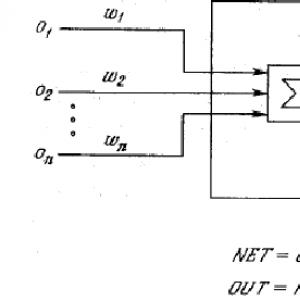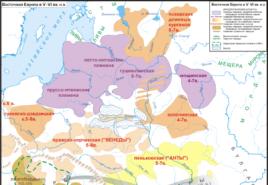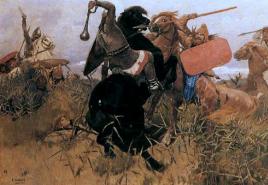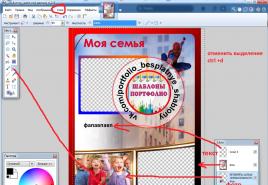Dubrovsky summary. A.S
Chapter 1. Troekurov is a wealthy landowner, Dubrovsky lives next door to him, they were good friends. At one of Troekurov's dinners, Dubrovsky learns that their family's forest is being stolen (everything that grows there). After this situation, Dubrovsky orders the thieves to be whipped and the horses to be taken away. Having learned about this, Troekurov focuses on revenge, colluding with the assessor Shabashkin. Chapter 2. The beginning of the trial where Dudrovsky could not defend his rights. A certain Spitsyn assures that Dubrovsky's estates are illegal and Troyekurov signs papers that confirm his right to the Dubrovskys' estate, the same document is offered to be signed by Dubrovsky, but he goes into shock and is taken home. Chapter 3. After all, Dubrovsky is very bad, the nanny sends a letter to him son, he immediately goes to his father. Chapter 4. The illness of the old master did not allow him to tell about the seriousness of the case. In the meantime, the deadline for filing an appeal expires and Kistenevka passes into the hands of Troekurov. In turn, Troekurov is not happy with such a victory, his conscience torments him. Troekurov decides to take a step towards peace, but Dubrovsky kicks him out, not wanting to listen. Due to nerves, Dubrovsky dies. Chapter 5. After the funeral, the covenant's officials go to Kistenevka to prepare the estate for transfer to Troekurov. But the peasants rebel and build various obstacles to them. Vladimir D. finds an approach to them and calms the excitement. He allows officials to stay overnight in the house. Chapter 6. At night, the Dubrovskys' house is set on fire on Vladimir's instructions. Chapter 7 fire.Chapter 8. The story about Mashenka Troekurova Chapter 9. Description of the temple holiday, which troekurov spends in his estate. During the feast, there is a discussion about the robbers of V. Dubrovsky, some argue that he robs selectively. Troyekurov declares that he is not afraid of a gang and will be able to cope with it if necessary. Chapter 10. Spitsyn is not so sure of the harmlessness of the robbers and asks the Frenchman Deforge to stay with him for the night. The turn of events is unusual, it turns out that Deforge is at the same time with Dubrovsky, they take away Spitsyn's money and threaten him to keep silent. Chapter 11 Pushkin talks about Dubrovsky's acquaintance with Deforge. He quickly fell in love with everyone in the house. (Dubrovsky is a Frenchman). Chapter 12. Dubrovsky's meeting with Masha. Suspicions of the Frenchman that this is Dubrovsky. Chapter 13. Arrival of Prince Vereisky. Troyekurov's daughter is very nice to him and he tries in every possible way to take care of the girl. Chapter 14 time Vereisky proposes to Mashenka. Troekurov accepts his proposal and prepares everything for the wedding. On the same day, Masha receives a letter from Dubrovsky, in which he asks her to come on a date with him. Chapter 15. Masha agrees to Dubrovsky's proposal. Dubrovsky offers her his help, but she stops him, hoping to still convince her father about marriage. Dubrovsky puts a ring on her finger and asks for a chance. danger of putting the ring in the hollow of an oak tree (it was there that they exchanged information with each other) Chapter 16. Masha decides to write. Vereisky has a letter that he would refuse to marry her, but he gives the letter to her father. Troekurov rushes the action of the wedding, and Masha is locked up. Chapter 17 It is impossible to put the ring, as a noise rises, during which the correspondence of lovers is found. Chapter 18 outfit and delivered to the church. She is married to Vereisky. On the way back, Dubrovsky, at the head of his robbers, attacks the crew. During the skirmish, Vereisky wounds Dubrovsky. As a result, Masha refuses to be saved, arguing that she is already married. Chapter 19 All forces are directed against the robbers. Dubrovsky understands that his people are doomed to death and therefore dissolves the gang, and he himself goes into the forest. Nobody else saw him.
The rich and noble master Kirila Petrovich Troekurov lives in his estate Pokrovskoye. Knowing his tough temper, all the neighbors are afraid of him, except for the poor landowner Andrei Gavrilovich Dubrovsky, a retired lieutenant of the guard and former colleague of Troekurov. Both are widows. Dubrovsky has a son, Vladimir, who serves in St. Petersburg, and Troekurov has a daughter, Masha, who lives with her father, and Troekurov often talks about his desire to marry children.
An unexpected quarrel quarrels friends, and Dubrovsky's proud and independent behavior alienates them even more from each other. The autocratic and omnipotent Troekurov, in order to vent his irritation, decides to deprive the Dubrovsky estate and orders the assessor Shabashkin to find a "legal" way to this lawlessness. The judge's chimps fulfill Troekurov's wish, and Dubrovsky is summoned to the Zemstvo judge to decide the case.
In the judicial session, in the presence of the litigants, a decision is read, full of legal incidents, according to which the estate of Dubrovsky Kistenevka becomes the property of Troekurov, and Dubrovsky has a fit of insanity.
Dubrovsky's health is deteriorating, and the serf old woman Yegorovna, who followed him, writes a letter to Vladimir Dubrovsky in St. Petersburg with a notification of what had happened. Having received the letter, Vladimir Dubrovsky takes a vacation and goes home. The dear coachman tells him about the circumstances of the case. At home, he finds a sick and decrepit father.
Andrei Gavrilovich Dubrovsky is slowly dying. Troekurov, tormented by conscience, goes to make peace with Dubrovsky, who, at the sight of the enemy, is paralyzed. Vladimir orders to tell Troekurov to get out, and at that moment old Dubrovsky dies.
After Dubrovsky's funeral, judicial officials and a police officer arrive in Kistenevka to introduce Troekurov into possession. The peasants refuse to obey and want to deal with the officials. Dubrovsky stops them.
At night, in the house, Dubrovsky finds the blacksmith Arkhip, who decided to kill the clerks, and dissuades him from this intention. He decides to leave the estate and orders all people to be taken out to set fire to the house. He sends Arkhip to unlock the doors so that the officials can leave the house, but Arkhip violates the master's order and locks the door. Dubrovsky sets fire to the house and quickly leaves the yard, and in the fire that has begun, the clerks die.
Dubrovsky is suspected of arson and murder of officials. Troekurov sends a report to the governor, and a new case is started. But here another event diverts the attention of everyone from Dubrovsky: robbers appeared in the province, who robbed all the landowners of the province, but did not touch only the possessions of Troekurov. Everyone is sure that the leader of the robbers is Dubrovsky.
For your illegitimate son Sasha Troekurov writes a French teacher from Moscow, Monsieur Desforges, who is greatly impressed by the beauty of the seventeen-year-old Marya Kirilovna Troekurova, but she does not pay any attention to the hired teacher. Deforge is put to the test by being pushed into a room with a hungry bear (a common joke with guests at Troyekurov's house). The unabashed teacher kills the beast. His determination and courage make a great impression on Masha. Between them there is a friendly rapprochement, which becomes a source of love. On the day of the temple feast, guests come to Troekurov's house. At dinner, they talk about Dubrovsky. One of the guests, a landowner named Anton Pafnutich Spitsyn, admits that he once gave false evidence in court against Dubrovsky in favor of Kirila Petrovich. One lady reports that Dubrovsky dined with her a week ago, and tells the story that her clerk, sent to the post office with a letter and 2000 rubles for her son, a guards officer, returned and said that Dubrovsky had robbed him, but was caught in lies by a man who came to visit her and who introduced himself as a former colleague of her late husband. The summoned clerk says that Dubrovsky really stopped him on the way to the post office, but, having read the mother's letter to his son, he did not rob. The money was found in the chest of the clerk. The lady believes that the person who pretended to be a friend of her husband was Dubrovsky himself. But according to her descriptions, she had a man of about 35 years old, and Troekurov knows for sure that Dubrovsky is 23 years old. This fact is also confirmed by the new police officer who is dining at Troekurov's.
The holiday in Troekurov's house ends with a ball, where the teacher also dances. After dinner, Anton Pafnutich, who has a large amount of money with him, expresses a desire to spend the night in the same room with Deforge, since he already knows about the courage of the Frenchman and hopes for his protection in the event of an attack by robbers. The teacher agrees to the request of Anton Pafnutich. At night, the landowner feels that someone is trying to take money from him, hidden in a bag on his chest. Opening his eyes, he sees that Deforge is standing over him with a pistol. The teacher informs Anton Pafnutich that he is Dubrovsky.
How did Dubrovsky get into Troekurov's house under the guise of a teacher? At the post station, he met a Frenchman on his way to Troekurov, gave him 10,000 rubles, and in return received the teacher's papers. With these documents, he came to Troekurov and settled in a house where everyone fell in love with him and did not suspect who he really was. Finding himself in the same room with a man whom, not without reason, he could consider his enemy, Dubrovsky could not resist the temptation to take revenge. In the morning, Spitsyn leaves Troekurov's house without saying a word about the night's incident. Soon the rest of the guests left. Life in Pokrovsky flows as usual. Marya Kirilovna feels love for Deforge and is annoyed with herself. Desforges treats her respectfully, and this assuages her pride. But one day Deforge furtively gives her a note in which he asks for a date. At the appointed time, Masha arrives at the appointed place, and Deforge informs her that he is forced to leave soon, but before that he must tell her something important. Suddenly, he reveals to Masha who he really is. Calming the frightened Masha, he says that he has forgiven her father. That it was she who saved Kirila Petrovich, that the house in which Marya Kirilovna lives is sacred to him. During Dubrovsky's confessions, a low whistle is heard. Dubrovsky asks Masha to give him a promise that in case of misfortune she will resort to his help, and disappears. Returning to the house, Masha finds an alarm there, and her father informs her that Deforge, according to the police officer who arrived, is none other than Dubrovsky. The disappearance of the teacher confirms the truth of these words.
The next summer, Prince Vereisky returns from foreign lands to his estate Arbatov, located 30 versts from Pokrovsky. He pays a visit to Troekurov, and Masha amazes him with her beauty. Troekurov and his daughter pay a return visit. Vereisky gives them a wonderful reception.
Masha sits in her room and embroiders. A hand reaches out through the open window and puts a letter on her hoop, but at this time Masha is called to her father. She hides the letter and goes. She finds Vereisky with her father, and Kirila Petrovich informs her that the prince is wooing her. Masha freezes in surprise and turns pale, but her father does not pay attention to her tears.
In her room, Masha thinks with horror about marriage with Vereisky and believes that it is better to marry Dubrovsky. She suddenly remembers the letter and finds only one phrase in it: "In the evening at 10 o'clock in the same place."
During a night meeting, Dubrovsky persuades Masha to resort to his patronage. Masha hopes to touch her father's heart with prayers and requests. But if he turns out to be inexorable and forces her to marry, she invites Dubrovsky to come for her and promises to become his wife. In parting, Dubrovsky gives Masha a ring and says that if trouble happens, it will be enough for her to lower the ring into the hollow of the specified tree, then he will know what to do.
A wedding is being prepared, and Masha decides to act. She writes a letter to Vereisky, begging him to give up her hand. But this backfires. Upon learning of Masha's letter, Kirila Petrovich, furious, schedules the wedding for the next day. Masha with tears asks him not to pass her off as Vereisky, but Kirila Petrovich is implacable, and then Masha declares that she will resort to Dubrovsky's protection. Having locked Masha, Kirila Petrovich leaves, ordering her not to let her out of the room.
Sasha comes to the aid of Marya Kirilovna. Masha instructs him to take the ring to the hollow. Sasha fulfills her order, but some ragged boy who sees this tries to take possession of the ring. A fight breaks out between the boys, a gardener comes to Sasha's aid, and the boy is taken to the manor's yard. Suddenly they meet Kirila Petrovich, and Sasha, under threat, tells him about the assignment that his sister gave him. Kirila Petrovich guesses about Masha's relations with Dubrovsky. He orders the captured boy to be locked up and sends for the police officer. The police officer and Troekurov agree on something and let the boy go. He runs to Kistenevka, and from there secretly sneaks into the Kistenevskaya grove.
Preparations for the wedding are underway in Troyekurov's house. Masha is taken to the church, where her fiancé is waiting for her. The wedding begins. Masha's hopes for the appearance of Dubrovsky evaporate. The young people are going to Arbatovo, when suddenly, on a country road, armed people surround the carriage, and a man in a half mask opens the doors. He tells Masha that she is free. Hearing that it was Dubrovsky, the prince shoots and wounds him. They seize the prince and intend to kill him, but Dubrovsky does not order him to be touched. Dubrovsky again tells Masha that she is free, but Masha replies that it is too late. Due to pain and excitement, Dubrovsky loses consciousness, and accomplices take him away.
In the forest there is a military fortification of a band of robbers, behind a small rampart there are several huts. An old woman comes out of one hut and asks the guard, who is singing a robber song, to shut up, because the master is resting. Dubrovsky lies in the hut. All of a sudden, the camp is in turmoil. The robbers under the command of Dubrovsky occupy certain places for each. The guards who came running report that there are soldiers in the forest. A battle ensues, in which the victory is on the side of the robbers. A few days later, Dubrovsky gathers his associates and announces his intention to leave them. Dubrovsky disappears. Rumor has it that he fled abroad.
In his estate in Pokrovsky lives a rich, self-confident and noble gentleman Kirill Petrovich Troekurov. The neighbors know his tough temper and are afraid, except for the poor landowner Andrei Gavrilovich Dubrovsky, a retired lieutenant and colleague. Both are widows. Dubrovsky has a son, Vladimir, who diligently serves in St. Petersburg, and Troekurov has a daughter, Masha, who lives with her father. The quarrel quarrels friends, and Dubrovsky's independent behavior alienates them from each other.
The autocratic Troekurov wants to deprive the Dubrovsky estate. In the judicial session, in the presence of the disputants, the decision is read, according to which the estate of Dubrovsky "Kistenevka" becomes the property of Troekurov. Dubrovsky's health is deteriorating. Krepostnaya Egorovna writes to Vladimir Dubrovsky in St. Petersburg, informing him of what has happened. Vladimir goes home. At home, he finds his decrepit and sick father. Andrei Gavrilovich is slowly dying. Tormented by conscience, Troekurov goes to make peace with Dubrovsky, who, at the sight of the enemy, is paralyzed. After Dubrovsky's funeral, judicial officials and a police officer arrive in Kistenevka.
The peasants refuse to obey and want to deal with them. Vladimir Dubrovsky decides to bring people out to set the house on fire. Dubrovsky sets fire to the house and leaves the yard, the clerks die in the burning house. Events appear that distract everyone's attention from Dubrovsky. Robbers appeared in the province, who rob all the landowners. Everyone is sure that the leader of the robbers is Dubrovsky. Troekurov sends a French teacher from Moscow, Monsieur Deforge, who is impressed by the beauty of Masha Kirillovna.
On the day of the temple feast, guests come to the Troekurovs' house. We are talking about Dubrovsky. One of the guests admits that he gave false testimony against Dubrovsky. The holiday in Troekurov's house ends with a ball. After dinner, the landowner, who has a large amount of money with him, remains to spend the night in the same room with the teacher, as he has heard about his courage and hopes for his protection. At night, he feels that at night someone is trying to take money from him. Opening his eyes, he sees a teacher with a pistol, who calls himself Dubrovsky.
At the post station, Dubrovsky meets a Frenchman who is on his way to Troyekurov. Having given ten thousand rubles to the Frenchman, Vladimir takes the teacher's papers and goes to Troyekurov's house. One day he gives a note to Masha asking for a date. Deforge announces that he must leave soon and reveals to Masha that he is Dubrovsky.
Prince Vereisky pays a visit to Troyekurov on the estate, and, seeing Masha, is amazed at her beauty. The father informs Masha that the prince is wooing her. Dubrovsky persuades Masha to turn to him for help if her father forces her to marry. In the house of Troekurov, they are preparing for the wedding. Masha is taken to the church, where her fiancé is waiting. The wedding begins. Young people go to Arbatovo. On a country road, the carriage is stopped by a man in a mask, who opens the doors and tells Masha that she is free.
In the forest, there is a military fortification of a band of robbers and several huts. Robbers under the command of Dubrovsky occupy posts. He gathers his companions and announces his intention to leave them.
Volume One
In one of his estates lives Kirila Petrovich Troekurov, a rich noble gentleman, an arrogant tyrant. Neighbors please him in everything and are afraid. Troekurov himself respects only his poor neighbor Andrey Gavrilovich Dubrovsky, his comrade in the past. Troekurov and Dubrovsky are both widowers. Dubrovsky has a son, Vladimir, and Troekurov has a daughter, Masha. Once Troekurov shows the guests, among whom is Dubrovsky, a kennel. Dubrovsky disapproves of the living conditions of Troekurov's servants compared to dogs. One of the houndsmen, offended, declares that Troekurov has. Offended, Dubrovsky leaves, sends a letter to Troekurov demanding an apology and punishment for the dog keeper. Troekurov is not satisfied with the tone of the letter. The conflict is aggravated by the fact that Dubrovsky discovers Troekurov's peasants stealing the forest in his possessions. Dubrovsky takes away their horses, and orders the peasants to be whipped. Upon learning of this, Troekurov becomes furious. Using the services of assessor Shabashkin, Troekurov claims his (non-existent) rights to the possession of Kistenevka, the estate of the Dubrovskys.
The court awards the estate to Troekurov (Dubrovsky's papers have burned down, and he cannot confirm his right to own Kistenevka). Troyekurov signs a document on the ownership of Kistenevka, when they offer to sign the same document to Dubrovsky, he goes crazy. He is sent to Kistenevka, which no longer belongs to him.
Dubrovsky is rapidly fading away. Nyanka Egorovna notifies Vladimir, a cornet, a graduate of the Cadet Corps, about the incident. Vladimir receives leave and goes to his father in the village. At the station he is met by the coachman Anton, who assures the young master that the peasants will be faithful to him, because they do not want to go over to Troekurov. Vladimir finds his father seriously ill and asks the servants to leave them alone.
The ill Dubrovsky is unable to give his son clear explanations regarding the transfer of the estate. The deadline for filing an appeal expires, Troekurov legally takes possession of Kistenevka. Kirila Petrovich himself feels uncomfortable, his thirst for revenge is satisfied, and he understands that he did not do justice to Dubrovsky. Troekurov goes to Dubrovsky, deciding to make peace and return to his old friend his rightful possession. When Dubrovsky, standing at the window, sees Troekurov approaching, he is paralyzed. Vladimir sends for a doctor and orders Troekurov to be expelled. Old Dubrovsky is dying.
After his father's funeral, Vladimir finds court officials and assessor Shabashkin at the Kistenev estate: the house is being handed over to Troekurov. The peasants refuse to go over to someone else's master, threaten the officials, step on them. Vladimir reassures the peasants. Officials stay in the house to spend the night.
Vladimir, not wanting Troekurov to get the house where he spent his childhood, orders to burn it, believing that the doors are not locked and the officials will have time to jump out. The blacksmith Arkhip locks the door (secretly from the owner) and sets fire to the estate, having managed, however, to save the cat from the fire. Officials are dying.
Troekurov personally conducts an inquiry into why the estate burned down. It turns out that the culprit of the fire is Arkhip, but suspicion also falls on Vladimir. Soon a gang of robbers appears in the vicinity, robbing the landowners' estates and burning them. Everyone decides that the leader of the robbers is Vladimir Dubrovsky. However, for some reason the robbers do not touch Troekurov's estate.
History of Masha Troekurova. Masha grew up in seclusion, reading novels. Kirila Petrovich brings up Sasha, his son from a governess. For him, Troekurov writes out a young French teacher, Deforge. One day Troekurov pushes the teacher into a room with a bear for fun. The Frenchman, not at a loss, shoots and kills the beast, which makes a great impression on Masha. Troekurov respects the teacher for his courage. The Frenchman begins to give the girl music lessons. Soon Masha falls in love with him.
Volume two
On October 1, on the day of the temple feast, guests come to Troekurov. Anton Pafnutevich Spitsyn is late, explains that he was afraid of Dubrovsky's robbers (it was he who testified under oath that the Dubrovskys illegally own Kistenevka). Spitsyn himself has a large amount of money with him, which he hides in a special belt. The police officer swears that he will catch Dubrovsky, since he has a list of signs of a robber, however, according to Troekurov, a lot of people can fit into the list of these signs. The landowner Anna Savishna assures that Dubrovsky is fair. Upon learning that she was sending money to her son in the guard, he did not rob her. Troekurov declares that in the event of an attack he will cope with the robbers on his own and tells the guests about the feat of Deforge.
Spitsyn asks Deforge to spend the night with him in the same room, as he is afraid of being robbed. At night, Deforge, disguised as Dubrovsky, robs Spitsyn of money and intimidates him so that Spitsyn does not betray him to Troekurov.
The author returns to how Dubrovsky met the Frenchman Deforge at the station, offered him 10,000 in exchange for documents and a letter of recommendation to Troekurov. The French gladly agreed. Everyone in the Troekurov family fell in love: Kirila Petrovich for his courage, Masha, Sasha, the household.
During the lesson, the teacher gives Masha a note with a request to meet in the gazebo by the stream. Vladimir reveals his real name to the girl, assures her that he no longer considers Troekurov his enemy thanks to Masha, whom he is in love with. Explains that he has to go into hiding. Offers the girl his help in case of misfortune. In the evening, a police chief comes to Troekurov to arrest the French teacher: based on the testimony of Spitsyn, he is sure that the teacher and Vladimir Dubrovsky are the same person. Teachers are not found on the estate.
At the beginning of the next summer, the owner, Prince Vereisky, an Englishman of about 50, arrives at the estate next to Troekurov. Vereisky closely converges with Kirila Petrovich and Masha, takes care of the girl, admires her beauty.
Vereisky proposes. Troekurov accepts him and orders his daughter to marry the old man. Masha receives a letter from Dubrovsky asking for a date.
Masha meets with Dubrovsky, who already knows about the prince's proposal. Offers. She asks not to interfere yet, she hopes to convince her father herself. Dubrovsky puts a ring on her finger. If Masha puts him in the hollow of the oak through which they exchanged letters, this will be a signal to him that the girl needs help.
Masha writes a letter to Vereisky with a request to back down, but he shows the letter to Troekurov, and they decide to speed up the wedding. The car is locked up.
Masha asks Sasha to lower the ring into the hollow of the oak. Having fulfilled the request of his sister, Sasha finds the red-haired boy near the oak, decides that he wants to steal the ring. The boy is brought for interrogation to Troekurov, he does not confess his involvement in the correspondence of lovers. Troekurov releases him.
Masha is dressed up in a wedding dress, taken to the church, where the wedding ceremony of Masha and Vereisky takes place. On the way back, Dubrovsky appears in front of the carriage and offers Masha release. Vereisky shoots, injuring Dubrovsky. Masha refuses the offered help, as she is already married.
The camp of the robbers of Dubrovsky. The troops start rounding up, the soldiers surround the rebels. Robbers and Dubrovsky himself bravely
are fighting. Realizing that they are doomed, Dubrovsky dissolves the gang. Nobody saw him again.
In one of his estates lives Kirila Petrovich Troekurov, a rich noble gentleman, an arrogant tyrant. Neighbors please him in everything and are afraid. Troekurov himself respects only his poor neighbor Andrey Gavrilovich Dubrovsky, his comrade in the past. Troekurov and Dubrovsky are both widowers. Dubrovsky has a son, Vladimir, and Troekurov has a daughter, Masha. Once Troekurov shows the guests, among whom is Dubrovsky, a kennel. Dubrovsky disapproves of the living conditions of Troekurov's servants compared to dogs.
One of the kennels, offended, declares that “it would be nice for a different gentleman to exchange the estate for a dog kennel” with Troekurov. Offended, Dubrovsky leaves, sends a letter to Troekurov demanding an apology and punishment for the dog keeper. Troekurova is not satisfied with the tone of the letter. The conflict is aggravated by the fact that Dubrovsky discovers Troekurov's peasants stealing the forest in his possessions.
Dubrovsky takes away their horses, and orders the peasants to be whipped. Upon learning of this, Troekurov becomes furious. Using the services of assessor Shabashkin, Troekurov claims his (non-existent) rights to the possession of Kistenevka, the estate of the Dubrovskys. Chapter 2 The court awards the estate to Troekurov (Dubrovsky's papers have burned down, and he cannot confirm his right to own Kistenevka).
Troyekurov signs a document on the ownership of Kistenevka, when they offer to sign the same document to Dubrovsky, he goes crazy. He is sent to Kistenevka, which no longer belongs to him. Chapter 3 Dubrovsky is quickly fading away. Nyanka Egorovna notifies Vladimir, a cornet, a graduate of the Cadet Corps, about the incident.
Vladimir receives leave and goes to his father in the village. At the station he is met by the coachman Anton, who assures the young master that the peasants will be faithful to him, because they do not want to go over to Troekurov.
Vladimir finds his father seriously ill and asks the servants to leave them alone. Chapter 4 The ill Dubrovsky is unable to give his son clear explanations about the transfer of the estate. The deadline for filing an appeal expires, Troekurov legally takes possession of Kistenevka. Kirila Petrovich himself feels uncomfortable, his thirst for revenge is satisfied, and he understands that he did not do justice to Dubrovsky. Troekurov goes to Dubrovsky, deciding to make peace and return to his old friend his rightful possession. When Dubrovsky, standing at the window, sees Troekurov approaching, he is paralyzed.
Vladimir sends for a doctor and orders Troekurov to be expelled. Old Dubrovsky is dying. CHAPTER 5 After his father's funeral, Vladimir finds court officials and assessor Shabashkin at the Kistenev estate: the house is handed over to Troekurov. The peasants refuse to go over to someone else's master, threaten the officials, step on them.
Vladimir reassures the peasants. Officials stay in the house to spend the night. CHAPTER 6 Vladimir, not wanting Troekurov to get the house where he spent his childhood, orders to burn it, believing that the doors are not locked and the officials will have time to jump out. The blacksmith Arkhip locks the door (secretly from the owner) and sets fire to the estate, having managed, however, to save the cat from the fire. Officials are dying. Chapter 7 Troekurov personally conducts an inquiry into why the estate burned down.
It turns out that the culprit of the fire is Arkhip, but suspicion also falls on Vladimir. Soon a gang of robbers appears in the vicinity, robbing the landowners' estates and burning them. Everyone decides that the leader of the robbers is Vladimir Dubrovsky. However, for some reason the robbers do not touch Troekurov's estate. Chapter 8 The story of Masha Troekurova.
Masha grew up in seclusion, reading novels. Kirila Petrovich brings up Sasha, his son from a governess. For him, Troekurov writes out a young French teacher, Deforge. One day Troekurov pushes the teacher into a room with a bear for fun. The Frenchman, not at a loss, shoots and kills the beast, which makes a great impression on Masha. Troekurov respects the teacher for his courage.
The Frenchman begins to give the girl music lessons. Soon Masha falls in love with him.
Roman "Dubrovsky" A.S. Pushkin is the most famous Russian robber novel, created in the spirit of the genre of literary composition, popular in England, France and Germany of the 18th-19th centuries, in the center of which is the image of a noble robber.
The novel is based on the idea of the moral decay of the Russian nobility and its opposition to the common people. The themes of protection of honor, family lawlessness, peasant revolt are revealed.
History of creation
The novel in 3 parts was begun by Alexander Pushkin (1799 - 1837) after finishing work on the composition of Belkin's Tale in the autumn of 1832.
Pushkin wrote only 2 volumes of the planned three-volume work, the second of which was completed in 1833, that is, work on the novel went quite quickly. The third volume was never launched.
The first publication of the work took place 4 years after the death of the poet in a duel in 1841. Pushkin did not leave the name of the novel in the manuscript, and he was prefaced with the name of the protagonist "Dubrovsky".
The basis for the work was a case told to the poet by his comrade Nashchokin. According to the story, the landowner Ostrovsky, ruined by the fault of a high-ranking neighbor, gathered his serfs and created a gang of robbers. History interested Pushkin as a realistic basis for prose writing.
Analysis of the work
Main plot

(Illustration by B. M. Kustodiev "Troekurov chooses puppies")
The landowners Troekurov and Dubrovsky, the father of the protagonist Vladimir, are neighbors and friends. Row conflict situations they divorce friends from each other, and the Troekurovs, taking advantage of their special position, claim the rights to the neighbor's only estate. Dubrovsky is unable to confirm his right to the estate and goes crazy.
The son Vladimir, who arrived from the city, finds his father near death. Soon the elder Dubrovsky dies. Not wanting to put up with injustice, Vladimir burns down the estate along with the officials who came to register it for Troekurov. Together with the devoted peasants, he goes into the forest and terrifies the entire district, however, without touching the people of Troekurov.
A French teacher goes to serve in the Troekurovs' house and, thanks to bribery, Dubrovsky takes his place. In the enemy's house, he falls in love with his daughter Masha, who loves him back.
Spitsyn recognizes in the French teacher a robber who robbed him. Vladimir has to go into hiding.
At this time, the father gives Masha in marriage to the old prince against his will. Vladimir's attempts to upset the marriage are not successful. After the wedding, Dubrovsky and his gang surround the carriage of the young and Vladimir frees his beloved. But she refuses to go with him, as she is already married to another.
The provincial authorities are making an attempt to surround Dubrovsky's gang. He decides to stop the robbery and, disbanding the people loyal to him, goes abroad.
main characters

Vladimir Dubrovsky in the work of Pushkin appears as one of the most noble and courageous heroes. He is the only son of his father, a hereditary impoverished nobleman. The young man graduated Cadet Corps and is a cornet. At the time of the news about the estate taken from his father, Vladimir was 23 years old.
After the death of his father, Dubrovsky gathers loyal peasants and becomes a robber. However, his robbery is painted with noble tones. All the victims of the gang are rich people leading an unworthy lifestyle. In this, the image of the protagonist largely intersects with the image of Robin Hood.
Dubrovsky's goal is revenge for his father and it is aimed at Troekurov. Under the guise of a teacher, Vladimir settles in the landowner's house and starts good relations with all family members, and falls in love with his daughter Masha.
Dubrovsky's courage and determination are evidenced by an incident in Troekurov's house. After being jokingly locked in a room with a bear, Dubrovsky does not lose his temper and kills the bear with one shot from a pistol.
After meeting with Masha the main objective the hero changes. For the sake of reuniting with his beloved, Dubrovsky is ready to give up his desire to take revenge on her father.
Masha's refusal to follow Dubrovsky after her marriage to Vereisky, as well as the raid on the gang, force Vladimir to abandon his plans. He nobly lets his people go, not wanting to drag them into trouble. The rejection of his beloved and the flight abroad testify to the humility of the young man and unwillingness to go against fate.
In the existing outlines for the third volume, Vladimir's return to Russia and attempts to return Masha can be traced. In this regard, we can say that the hero does not give up his love, but only accepts the desire of his beloved to live according to church laws.

(note from the editor - Kirila Petrovich - not to be confused with Kirill)
Troyekurov is the main negative character in the novel. A rich and influential landowner knows no bounds in his tyranny; for the sake of a joke, he can lock a guest in a room with a bear. At the same time, he respects independent people, which include Vladimir's father Andrei Gavrilovich. Their friendship comes to an end because of trifles and Troekurov's pride. Deciding to punish Dubrovsky for insolence, he appropriates his estate, using his unlimited power and connections.
At the same time, the image of Troekurov is built not only in negative tones. The hero, having cooled down after a quarrel with a friend, regrets his act. In his behavior, Pushkin lays down the scheme of the Russian social order, in which the nobles felt themselves omnipotent and unpunished.
Troekurov is characterized as a loving father. His youngest son was born out of wedlock, but is brought up in a family on an equal footing with his eldest daughter Masha.
The pursuit of profit can be traced in the choice of a husband for her beloved daughter Masha. Troekurov knows about his daughter's reluctance to marry an old man, but organizes a wedding and does not allow his daughter to run away with her beloved Dubrovsky. This is a great example of how parents try to make their children's lives contrary to their wishes.

Masha Troekurova at the time of the action is a 17-year-old girl who is brought up in the loneliness of a large estate, she is silent and withdrawn into herself. Her main outlet is her father's rich library and French novels. The appearance in the house of a French teacher in the form of Dubrovsky for a romantic young lady develops into love, similar to numerous novels. The truth about the personality of the teacher does not frighten the girl, which speaks of her courage.
It is important to note that Masha is principled. Married to an unwanted husband - an old count - Masha rejects Dubrovsky's offer to run away with him and talks about her duty to her husband.
The work is dramatic in its composition and stands on bright contrasts:
- friendship and judgment
- meeting of the protagonist with his native places and father's death,
- funeral and fire
- holiday and robbery,
- love and escape
- marriage and battle.
Thus, the composition of the novel is based on the conflict method, that is, the collision of contrasting scenes.
The novel "Dubrovsky" by Pushkin under the shell of a romantic composition contains a number of deep reflections of the author on the problems of Russian life and structure.







